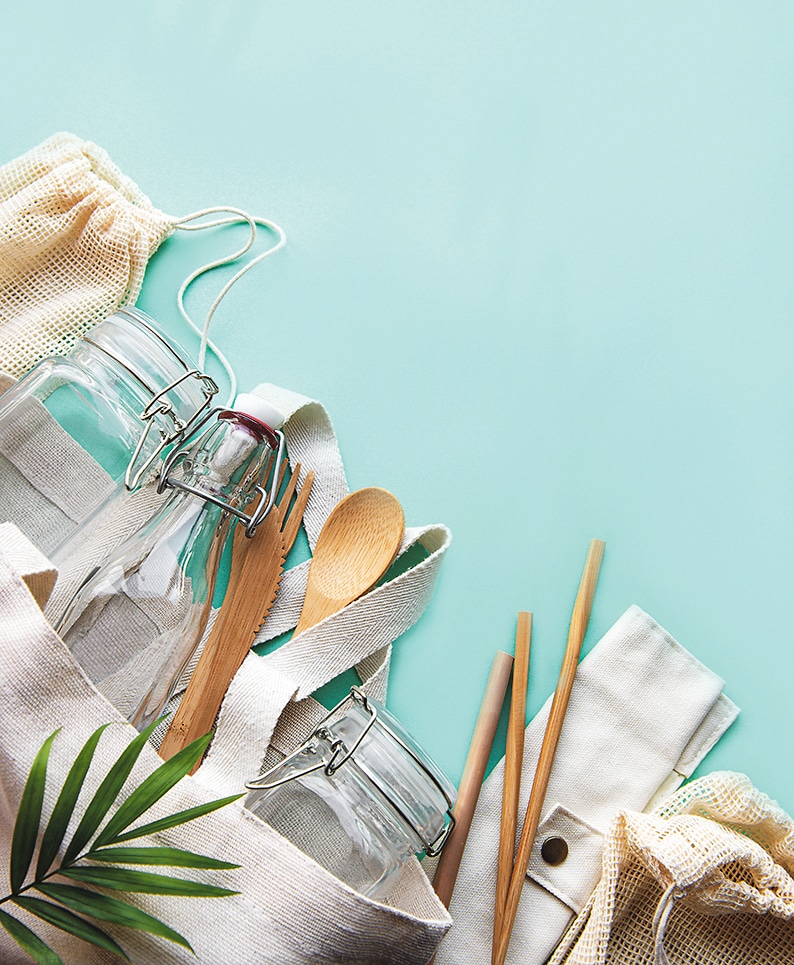It’s no secret that coming home from a weekly shop can give you a headache just from the sheer amount of plastic packaging that might accumulate. We are told time and time again to ‘reduce, reuse, and recycle’ but the hard reality of wanting to do good for the planet means that we, as consumers, must make difficult choices when buying our groceries. Questions like ‘should I choose a recyclable plastic milk bottle over a carton?’ or ‘which is better: compostable or biodegradable packaging?’ spring to mind, but with a better understanding of the options available to us and some small adjustments to our routine we can avoid the worse of a bad bunch without too much effort.
The plastic bag levy introduced in 2015 made it easy for people to switch from single-use to reusable bags and proved to be successful in reducing our plastic bag consumption. Carrying reusable bags doesn’t require too much effort on our part, and without the bag levy scheme we would be dealing with a lot more waste in the ditches and rivers today.
It must be said that avoiding waste will always be better than recycling it, and I encourage people to choose package-free goods wherever possible. All things considered, recycling is better than landfill or incineration, but the transportation, sorting, cleaning, and processing of recyclable waste all emit fossil fuels and therefore contribute to climate change, so we should really avoid recycling as much as possible.
So how does one avoid waste when doing their shopping? I recommend bringing your own reusable produce bags for things like bread and loose fruit and vegetables, and to bring refillable containers at the meat and cheese counters of the supermarket to do this successfully.
We are lucky in West Cork to have plenty of farmers markets to pick from, with many stall holders offering delicious, locally made, and freshly produced food. Fresh bread, vegetables, cheese, jam, and even fish; you can find it all at a local market – just remember to bring enough reusable bags and containers along, and you will see a massive reduction in the waste that you would otherwise bring home from the supermarket. Additionally, stall holders will gladly take egg cartons to reuse, and some offer refills of eco-friendly household cleaning products like washing up liquid and detergent.
It’s not always convenient to attend farmers markets however, and in this regard some producers offer their goods on the NeighbourFood network – a clever way of doing your grocery shopping at the click of a button while supporting local producers. Just select the produce you want on their website, leave a note that you would rather not get plastic packaging, and a cardboard box with all your goods will be ready for collection at a specific time. You can then transfer all your goodies to your own shopping bag and give NeighbourFood their cardboard box back.
Package-free shopping requires some advance planning, and people with busy lives don’t always have the time or mental space to think about those things. For this reason, where you can’t buy package-free products, aim to buy goods that come in infinitely recyclable packaging like glass or metal, or compostable packaging like paper or card.
Paper and card are better than plastic because they biodegrade quickly, and glass recycling has been proven to be the most environmentally friendly option. If you were on the fence about choosing between a glass or a plastic bottle for your favourite brown sauce, wonder no more!
Compostable plastic’ is confusing
In the last few years, food producers and supermarkets started offering biodegradable and compostable plastic alternatives. It is worth noting that while biodegradable plastic breaks down and decomposes in the environment, it may still contain petroleum-based materials. Compostable plastic, also called ‘bioplastic’ is made from raw materials like corn starch or dextrose (a sugar produced by plants) which break down overtime but may require an industrial composter to decompose. Both biodegradable and compostable plastics can cross-contaminate the recycling process of plastic and should be disposed of in the general waste bin, unless it is ‘home compostable’, in which case it can be safely placed in the compost bin. If unsure, choose ‘home compostable’ plastics over ‘compostable’ and ‘biodegradable’ ones.
Doing good for the planet can feel like a minefield, but it will benefit the generations to come. A Chinese proverb says that ‘A journey of a thousand miles begins with a single step’, so pat yourself on the back if you introduce one little change in your shopping routine this month. And remember, you don’t have to do it all in one go – one thing done badly is better than doing nothing at all.
www.seasidesquirrel.ie
@seasidesquirrel




